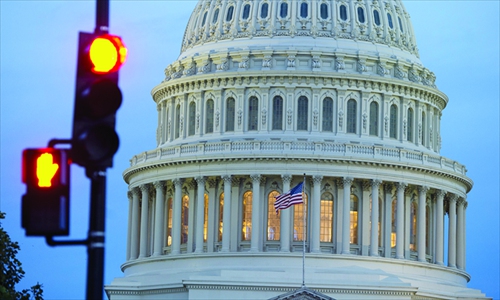HOME >> SOURCE
Washington’s unsustainable deficit hangs over global economy
Source:Global Times Published: 2020/1/14 22:27:33

File photo
With the widening US budget gap, it is no longer a secret that such a high level of federal spending is unsustainable and the resulting debt burden has become a worry for the global economy.According to data from the US Treasury Department, the federal budget deficit went on the rise in 2019, hitting $1.02 trillion and marking the first calendar year the deficit has exceeded $1 trillion since 2012. Given the country's tax revenues, government spending is obviously on an unsustainable path. While total government receipts grew 5 percent in 2019, federal spending increased at a faster pace of 7.5 percent.
More worryingly, as the economy slows amid headwinds, it is basically impossible for the US government to make ends meet by raising tax revenues. So based on the current trend, it will probably become a norm for the annual federal deficit to top $1 trillion in the future.
Undoubtedly, massive fiscal deficits will prompt a steady rise in public debt. According to data released by the Treasury Department on November 1, the US national debt surpassed $23 trillion for the first time in history. The figure is equivalent to about 110 percent of the country's GDP.
Of course, it should be acknowledged that US Treasury bonds are still considered safe-haven assets in the current uncertain global markets as they are seen as secure due to their strong ratings. Treasury securities held by foreign holders amounted to $6.78 trillion as of the end of October 2019, up $580 billion compared with a year earlier, according to Treasury data issued on December 16, 2019.
In the meantime, however, the share of US debt held by foreign holders has fallen from a peak of 34.1 percent in July 2012 to about 29 percent today. The decline also reflects the accelerated expansion of US debt issuance.
So far there is no sign of any sort of sustained plan for narrowing the US deficit to at least rein in its debt expansion. Nor does the government show any sign of urgency on this issue. Maybe the only response from the Trump administration is to pressure the Federal Reserve to cut rates, a move that could help lower its interest payments on debt and devalue its currency to ease the debt burden.
Such surge in irresponsibility could be attributed to two factors - its high creditworthiness and the financial supremacy of the US dollar. Since a collapse of the US economy may cause an economic disaster around the world, the US government could be better off counting on the world to pay the bill.
Sadly, there is no way out under the current circumstances, and the only hope now is that Americans will take some concrete measures to reverse the trend before a debt crisis truly breaks out.
Posted in: GT VOICE